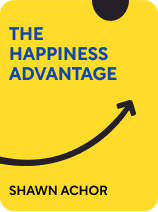

This article is an excerpt from the Shortform book guide to "The Happiness Advantage" by Shawn Achor. Shortform has the world's best summaries and analyses of books you should be reading.
Like this article? Sign up for a free trial here .
What is the connection between happiness and success? Can being happy increase your chances of success?
In The Happiness Advantage, Shawn Achor shows that happier people tend to be more successful. It’s often thought that success brings us happiness, but it’s actually the other way around.
Here’s the connection between happiness and success.
The Relationship Between Happiness and Success
A common approach to life is predicated on the idea that happiness comes after success, and that success comes after hard work. But we’ve had the equation all wrong. Here’s the real connection between happiness and success.
The Happiness Advantage, published in 2010, is an introduction to a relatively new formula for success, based on research in positive psychology and neuroscience. Under this paradigm, not only can you put your happiness first, but you can actually achieve greater success as a result. Author Shawn Achor offers insight as a leading expert on the connection between happiness and success. In addition to studying under several pioneers of positive psychology, Achor helped create and teach a popular Harvard course on happiness, he has written multiple books about happiness and success, and he founded a research and consulting firm that optimizes people’s achievement through positive psychology.
The Benefits of Happiness
The field of psychology has historically been uninterested in studying happiness. Instead, it’s focused on unhappiness and mental health challenges, in an effort to help people with below-average happiness ascend to average happiness levels. While that is an important goal, it strives to reach average, instead of seeking above-average happiness. The relatively new field of positive psychology inverts the lens: Instead of focusing on why unhappy people are suffering, positive psychology asks why happy people are thriving.
Positive psychology suggests that happiness isn’t the result of success—it’s the cause of it. Research supports the connection between happiness and success:
- Doctors who are primed to be in a positive mood diagnose patients 19% faster than their neutrally primed peers. Priming is a process in which a person is exposed to a suggestion or idea that influences her thoughts and behaviors. (Shortform note: Many experts question the validity of priming because follow-up studies have failed to replicate results that confirm its effects.)
- Optimistic salespeople outsell their pessimistic coworkers by 56 percent.
- Students primed for happiness outperform their peers on math achievement tests.
The benefits of happiness raise the quality of your personal life, and they also optimize your success at work. Studies show that positive psychology can help managers increase customer satisfaction by 42 percent and CEOs increase their productivity by 15 percent. Even in the most stressful environments, the principles of the Happiness Advantage have brought positive results to a wide range of businesses across 40 countries and five continents, including:
- A business community operating in Zimbabwe’s collapsed economy
- Big bank employees in the wake of the 2008 financial crisis
- Law schools and law firms, where students and employees suffer from high rates of depression and mental distress
- Hundreds of managers at a tax auditing firm during the first tax season following the 2008 stock market drop
How to Become Happier
If it’s true that there’s a connection between happiness and success, how can you become happier? Using research and personal anecdotes, Achor covers the following seven principles in this book:
- Reap the benefits of happiness: Happiness promotes productivity and success, and employers and managers can use these principles to achieve results in the workplace.
- Leverage the power of a positive mindset: Your mindset affects your efforts and your actions.
- Train your brain to see the positive: When you develop a positive thinking pattern, you program your brain to focus on the positive and optimize the benefits of positivity.
- Learn and grow through adversity: Adversity is inevitable, but, if you stay positive during challenging times, you will not only carry on, but also learn and grow through the process.
- Stay in control through incremental achievements: Focus on small, manageable goals to keep you in control and build your confidence and motivation.
- Create positive habits: Maintain healthy behaviors by turning them into habits.
- Optimize the benefits of social connections: Social support raises your happiness and productivity.
Thousands of people have used these seven principles to become happier, and you can too.

———End of Preview———
Like what you just read? Read the rest of the world's best book summary and analysis of Shawn Achor's "The Happiness Advantage" at Shortform .
Here's what you'll find in our full The Happiness Advantage summary :
- How happiness isn’t the result of success, it’s the cause of it
- The benefits of happiness—from increased creativity to improved health
- Strategies for adopting a positive mindset and raising your happiness baseline






